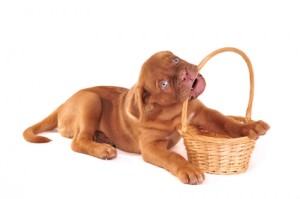
Puppy baby teeth (formally known as deciduous teeth) are those a dog first develops, usually during the initial few weeks of life. Puppies have 28 deciduous teeth, which is a lot less that they will eventually have when they reach their adult age. Adult dogs have 42 permanent teeth, and require comprehensive pet dental care to keep them healthy.
Baby teeth will start to fall out on their own when your puppy is between 3 and 6 months old. Some puppies – especially those that are big chewers – lose their teeth even sooner, while others might not lose all their puppy baby teeth until they are 9 months old.
Getting Regular Check-Ups
It’s important that you check your puppy’s mouth or schedule a visit with your vet for a full dental checkup when he’s around 6 months of age. That’s because sometimes puppy baby teeth become impacted and won’t fall out on their own. This can cause permanent teeth to come in crooked and often leads to more serious problems later on. For example, if the permanent tooth grows against the deciduous tooth, it can create a small pocket in between the two teeth. It’s easy for food and debris to become trapped there, leading to cavities, periodontal disease, and even the potential loss of teeth.
When Things Go Wrong
If your puppy is not losing his baby teeth as or when he or she should, talk to your vet. If it becomes obvious that a deciduous tooth is not going to fall out on its own, your vet will recommend extraction. The earlier this is done, the better, since doing so allows the permanent tooth to position itself correctly, preventing pain and other problems later on.
Tooth extraction requires not only general anesthesia, but also professional expertise to prevent damage to the gum and the surrounding tooth. This is especially important if the permanent tooth has already come out of the gum and there’s risk of damaging it during the extraction. When choosing a veterinarian for a tooth extraction, always make sure he or she has experience in pet dental care and does dental radiography.
Dental Care for the Long Run
While more and more people are becoming aware of how important it is to brush their dogs’ teeth, many start pet dental care too late. The logic behind it is that since dogs have baby teeth that will fall out, there’s no need to start brushing until the permanent teeth are in place.
The major problem with this scenario is that if you wait too long, your dog might resist the idea later on. Home brushing is the first (and best) line of defense against dental problems later in life – but it is only effective if you do it regularly and properly.
Start Early
The best way to do that? Start brushing when your dog is a puppy. The earlier you start, the more normal it will feel for your puppy. You can start by playing with your puppy’s mouth, touching his gums and using your index finger as a brush. This will get your dog used to the motion but also to the idea of having something inside his or her mouth.
As puppies get older and this becomes comfortable, you can then move on to using a piece of gauze wrapped around your finger—and eventually a toothbrush.
Remember: dogs have baby teeth that determine their dental health later in life. Having healthy teeth and gums can also help prevent a number of other health conditions, including kidney disease, liver problems and more—all of which have been linked to periodontal disease.

